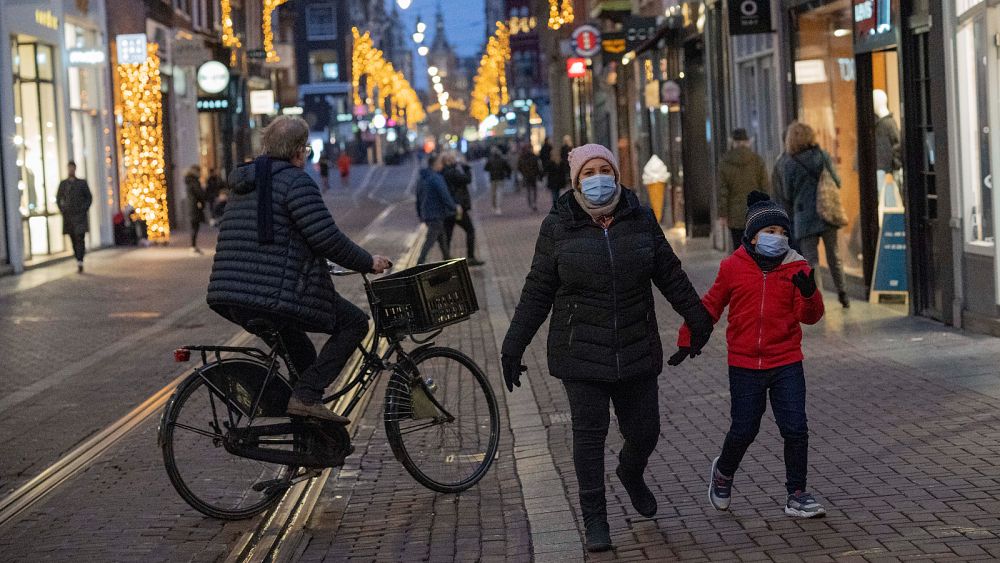
The Dutch government has announced that bars, restaurants, museums, theatres and other venues are to be allowed to re-open under conditions, loosening some of the toughest COVID-19 restrictions in Europe.
For more than a month, bars, restaurants, and cultural venues have been closed, while strict quarantine rules have shut a quarter of primary school classes in the Netherlands.
The announcement by Prime Minister Mark Rutte on Tuesday evening comes despite record new coronavirus infection levels, as hospitalisations from the country’s Omicron wave have been lower than initially feared.
“We are taking a big step today to unlock the Netherlands while the infections numbers are really going through the roof,” Rutte told a news conference in The Hague, saying the move was not without risks.
The announcement wasn’t all good news for the beleaguered hospitality and cultural sectors, with the opening hours limited to 10 pm, while professional sports teams will only be allowed to fill stadiums to a third of their normal capacities.
Football clubs and administrators protested against the move even before it was officially announced, calling it in a joint statement “a proposal without perspective”.
Pressure from local politicians has pushed Rutte’s government to ease the restrictions, especially after mayors from 30 municipalities petitioned the government last week.
There have been widespread protests by business owners ranging from the Van Gogh Museum to local cafes at being excluded from am earlier easing of pandemic restrictions.
“I can’t explain why here in Breda IKEA is open but the theatre, where people can safely watch a performance, is closed,” said Breda’s mayor Paul Depla, speaking before the announcement.
The Dutch national public health institute reported a 51% rise in new COVID-19 cases over the last week to more than 366,000, while intensive care admissions dropped by 34%.
No easing of coronavirus measures in Germany
In neighbouring Germany, a meeting between federal leaders and chancellor Olaf Scholz concluded that high infection rates left no room to relax the current tight restrictions on private gatherings and large meetings.
“It is time to stay the course,” German chancellor Olaf Scholz said in Berlin on Monday, for whom it became apparent that the access restrictions that have been in place for months should remain in place in the workplaces, on buses, trains, restaurants, and shops.
Scholz was echoed by the State Premier of North Rhine-Westphalia, Hendrik Wuest, who added that “experts of the federal government are considering an overload of the health system.”
“The council of experts has given a clear warning: the infection trend requires the maintenance of and the strict adhesion to the current measures,” Wuest went on.
Russia reduces isolation period
Russian health authorities have shortened the required isolation period for those who come in contact with COVID-19 patients from 14 days to seven, an unprecedented Omicron-driven surge of coronavirus infections rips through the vast country.
Prime Minister Mikhail Mishustin announced the degree on Tuesday (January 25). It only changes the rules for those who had close contact with someone who has COVID-19, not for those with a confirmed infection. Those who test positive are still required to isolate for 14 days, with a mandatory test on day 10 or 11.
Daily new infections in Russia have been rising sharply for the past two weeks, increasing more than four-fold — from about 15,000 on January 10 to 67,809 on Tuesday, the highest daily tally in the pandemic.
However, according to Health Minister Mikhail Murashko, no significant increase in hospitalisations has been seen. Hospital admissions grew by just 6.4%.
Russia’s public healthcare watchdog says more than half of the country’s coronavirus infections are in the areas around Moscow and St Petersburg.
Croatian opposition petitions for COVID-19 inquiry
Meanwhile, in Croatia, opposition lawmakers handed in signatures for two petitions to the speaker of Croatia’s parliament in Zagreb on Monday, in the hope they will force a national referendum on the government’s handling of the coronavirus pandemic.
The group leading the initiative, the conservative populist party “Most” (“The Bridge”), seeks to challenge the authority of the coronavirus task force and wants a referendum that would pave the way for transferring any virus-related decision-making powers to parliament.
“Most”, which has eight MPs in the 151-seat parliament, also wants the people to be able to decide on whether or not to abolish the mandatory COVID-19 passes currently required for employees and customers at some public services, such as post offices and hospitals.
Croatia, which has high levels of vaccine-hesitancy in Europe as well as some of the laxest coronavirus restrictions, introduced mandatory COVID-19 certificates for all employees of public and state services in November.
The passes are available to anyone who has been vaccinated, anyone who has recovered from the virus, or anyone who has recently tested negative.
The move was met with large protests by pandemic-fatigued Croatians and was criticised by several right-wing opposition parties, who then launched initiatives to restrict the government’s decision-making powers, arguing that the body handling the pandemic is unconstitutional and that mandating any coronavirus passes is illegal.
If the referendum is given the go-ahead, it could take place in about two months. Only 55% of the population is inoculated against COVID-19 in Croatia.
THE ROTTEN FISH: CAN OF WORMS OPENED OF APC & TINUBU'S GOVERNMENT OVER NIGERIA'S ECONOMIC DOWNTURN
WATCH THE CRITICAL ANALYSIS AND KNOW THE RESPONSIBLE PARTIES TO BLAME FOR NIGERIA'S ECONOMIC CHALLENGES, WHILE CITIZENS ENDURE SEVERE HARDSHIPS.Watch this episode of ISSUES IN THE NEWS on 9News Nigeria featuring Peter Obi's Special Adviser, Dr Katch Ononuju, 9News Nigeria Publisher, Obinna Ejianya and Tinubu Support Group Leader, McHezekiah Eherechi
The economic crisis and hardship in Nigeria are parts of the discussion.
Watch, leave your comments, and share to create more awareness on this issue.
#9NewsNigeria #Nigeria #issuesInTheNews #politics #tinubu THE ROTTEN FISH: CAN OF WORMS OPENED ...
DON'T FORGET TO SUBSCRIBE AND LEAVE YOUR COMMENTS FOR SUBSEQUENT UPDATES
#9newsnigeria #economia #economy #nigeria #government @9newsng
www.9newsng.com
